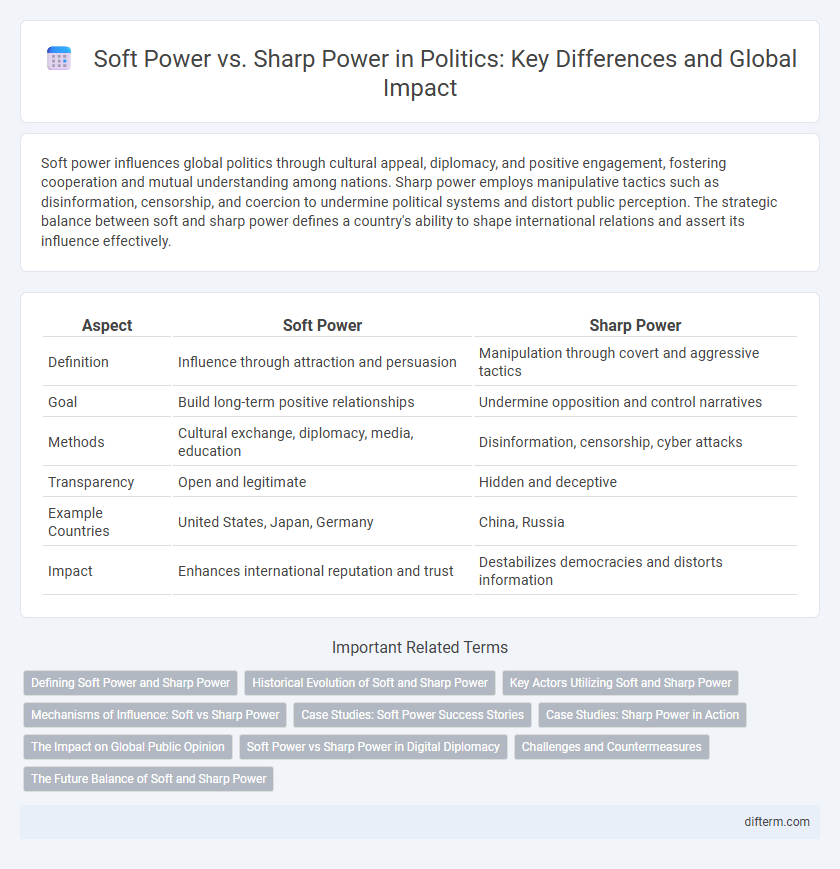Soft power influences global politics through cultural appeal, diplomacy, and positive engagement, fostering cooperation and mutual understanding among nations. Sharp power employs manipulative tactics such as disinformation, censorship, and coercion to undermine political systems and distort public perception. The strategic balance between soft and sharp power defines a country's ability to shape international relations and assert its influence effectively.
Table of Comparison
| Aspect | Soft Power | Sharp Power |
|---|---|---|
| Definition | Influence through attraction and persuasion | Manipulation through covert and aggressive tactics |
| Goal | Build long-term positive relationships | Undermine opposition and control narratives |
| Methods | Cultural exchange, diplomacy, media, education | Disinformation, censorship, cyber attacks |
| Transparency | Open and legitimate | Hidden and deceptive |
| Example Countries | United States, Japan, Germany | China, Russia |
| Impact | Enhances international reputation and trust | Destabilizes democracies and distorts information |
Defining Soft Power and Sharp Power
Soft power relies on cultural influence, diplomacy, and values to shape the preferences of other countries, fostering cooperation and goodwill without coercion. Sharp power employs manipulative tactics such as disinformation, censorship, and political interference to undermine opponents and control narratives covertly. Understanding the distinction between soft power's attraction-based approach and sharp power's coercive strategies is critical in analyzing modern geopolitical dynamics.
Historical Evolution of Soft and Sharp Power
Soft power originated in the mid-20th century as a strategic concept emphasizing cultural influence, diplomacy, and the promotion of values to shape international relations peacefully. Sharp power, emerging in the 21st century, reflects a more covert and manipulative approach utilizing disinformation, censorship, and influence campaigns to undermine democratic institutions and control narratives. The historical evolution from soft to sharp power highlights a shift in geopolitical tactics from attraction and cooperation to subversion and coercion.
Key Actors Utilizing Soft and Sharp Power
Key actors deploying soft power include countries like the United States, China, and the European Union, which leverage cultural diplomacy, educational exchanges, and media influence to shape global norms and public opinion. Sharp power is primarily employed by authoritarian regimes such as Russia and China, utilizing disinformation campaigns, cyberattacks, and covert political interference to undermine democratic institutions and manipulate political outcomes. International organizations and NGOs often counteract sharp power by promoting transparency, accountability, and open communication channels.
Mechanisms of Influence: Soft vs Sharp Power
Soft power operates through attraction and persuasion, leveraging cultural appeal, political values, and diplomacy to shape preferences and foster voluntary cooperation. Sharp power exploits manipulation, censorship, and covert influence to distort information and undermine democratic institutions, often using disinformation and cyber tactics. These contrasting mechanisms reflect differing strategic goals, with soft power cultivating legitimacy and sharp power seeking control and disruption.
Case Studies: Soft Power Success Stories
China's Confucius Institutes exemplify soft power success by promoting cultural exchange and language learning globally, enhancing China's international influence subtly yet effectively. South Korea's Hallyu wave, including K-pop and Korean dramas, has boosted the country's soft power by shaping positive global perceptions and increasing tourism and exports. Japan's use of anime and technology showcases soft power, fostering cultural diplomacy and strengthening bilateral relationships worldwide through entertainment and innovation.
Case Studies: Sharp Power in Action
Sharp power exploits digital platforms and disinformation campaigns to undermine democratic institutions and manipulate public opinion, as observed in Russia's interference in the 2016 U.S. elections and China's influence operations in Hong Kong. These case studies reveal the strategic use of censorship, propaganda, and covert activities aimed at destabilizing political systems and eroding trust in independent media. The effectiveness of sharp power lies in its covert nature, making detection and response by targeted countries more complex compared to soft power's open cultural diplomacy.
The Impact on Global Public Opinion
Soft power leverages cultural influence, diplomacy, and values to shape global public opinion positively, fostering trust and cooperation among nations. Sharp power utilizes coercive tactics like disinformation, censorship, and manipulation to distort perceptions and undermine democratic institutions. The competing dynamics between these strategies significantly impact international relations and public trust worldwide.
Soft Power vs Sharp Power in Digital Diplomacy
Soft power in digital diplomacy leverages cultural influence, values, and communication strategies to shape international perceptions and build long-term relationships. Sharp power employs manipulation, censorship, and disinformation campaigns to undermine opponents and control narratives online. The balance between soft power's attract-and-engage approach and sharp power's coercive tactics defines the modern landscape of diplomatic influence in cyberspace.
Challenges and Countermeasures
Soft power faces challenges from sharp power tactics such as disinformation, censorship, and covert influence campaigns that undermine democratic institutions and manipulate public opinion. Countermeasures include enhancing media literacy, strengthening transparency in political funding, and fostering international cooperation to expose and neutralize malign foreign interference. Governments must also invest in resilient civil societies and safeguard independent media to maintain the integrity of soft power influence.
The Future Balance of Soft and Sharp Power
The future balance of soft and sharp power will reshape global political strategies as states increasingly blend cultural influence with cyber tactics and disinformation campaigns. Emerging powers invest in digital diplomacy and media control to assert dominance while maintaining plausible deniability, challenging traditional notions of statecraft. Understanding this evolving interplay is crucial for policymakers to develop resilient frameworks that safeguard democratic values and promote sustainable international cooperation.
soft power vs sharp power Infographic

 difterm.com
difterm.com